Uber bought self-drive lorry company Otto in 2016, the same year it was foundedTwo of the biggest players in self-drive technology will meet in a San Francisco courtroom on Monday.
Ride-sharing firm Uber is being sued by Waymo, the self-driving company spun out of Google.
Uber is accused of stealing and using trade secrets relating to Lidar (light detection and ranging) - one of the technologies that enables an autonomous car to understand what is happening around it.
While bitter and expensive legal disputes between tech companies are common, it's rare for these tussles to be played out in public and in front of a jury - and that's what we'll see over the next three or so weeks.

Uber's co-founder Travis Kalanick is expected to give evidence this week
At stake is a potential damages payout of hundreds of millions of dollars. Or, perhaps worse, an injunction to halt, or at least hinder, Uber's self-driving research. This would be a big blow to the company, which once said leading the way in self-driving tech was critical to its survival.
Waymo will make its case first, and then it will be up to Uber to defend itself.
What is the accusation?
The row centres around a man named Anthony Levandowski, a former Google employee considered a leading mind in autonomous research.
He worked on Google's self-driving programme before leaving in January 2016. It is alleged that when he left, he took with him more than 14,000 confidential documents, which were blueprints and other technical information about Lidar.
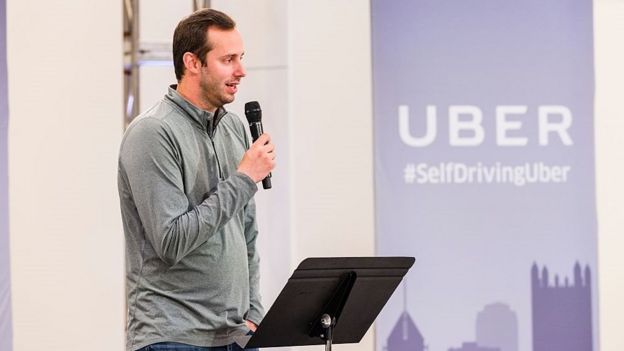
He then founded Otto, an autonomous trucking company, which after less than a year was acquired by Uber for $680m (£481m). It formed the basis of Uber's self-driving division, and Mr Levandowski was at the helm.
Waymo alleges this whole process was an elaborate charade, and that Uber, specifically then-chief executive Travis Kalanick, was in talks with Mr Levandowski before he left Google.
Otto was merely a front for Uber's plan to pinch their technology, Waymo claims.
Uber denies this version of events, though not entirely. It's not disputing the documents were taken, but insists it didn't gain anything whatsoever from them.
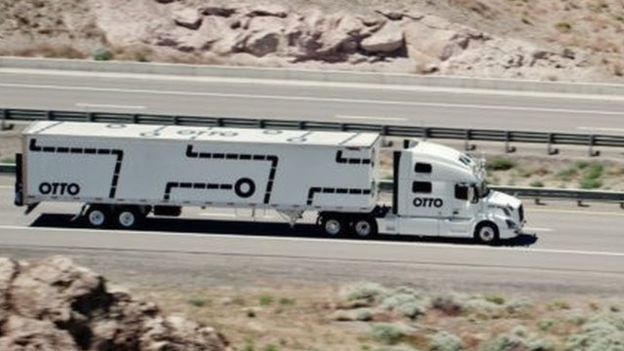
The crucial point Waymo will need to prove is that not only did Uber have the documents, but that it used them to gain an advantage of some kind.
What are the trade secrets?
In the original filing, Waymo cited 121 secrets and patents Uber was said to have stolen. That number has since been reduced to eight.
The significance of this reduction depends on which company's spin you want to follow. In background briefings, Uber said the fact so many of the claims were dropped from the case proved they were flimsy.
Waymo said it was forced to select a handful of the most significant claims in order to have a trial that didn't last months, or even years.
Judge William Alsup's comments, it has to be said, seem more closely aligned with Uber's interpretation.
He described at least one of the dismissed "secrets" as "Optics 101" - meaning, the very basics of the technology, not the kind of insight that would justify calling it a secret.
Either way, the jury will be asked to rule individually on the eight secrets. Discussions about the specifics will be off limits to press, but the jury will see each secret in detail in order to make its decision.
Part of that process will be determining whether the information could be considered a secret in the first place.
Key to Waymo's strategy will be convincing the jury that secrets can cover failure as much as success.

Google has accused Uber of using trade secrets related to Waymo's work on Lidar technology
If Waymo spent millions of dollars and hundreds of hours discovering that something didn't work, is Uber capitalising on that trade secret by saving itself the effort?
Who will appear in court?
While Mr Levandowski is on the witness list, don't expect much if he appears.
Throughout this case, he has "pleaded the Fifth" - the protection afforded by the American constitution to not say anything that could incriminate oneself. Because of this, Uber has since fired him.
Should Waymo call Mr Levandowski to the stand, we can assume it's theatre - the man at the centre of the row refusing to speak a peep is not a great look for Uber.
We expect, within the first few days, to hear from Mr Kalanick. The controversial co-founder of Uber was forced to step down as chief executive last year following a string of scandals of which this case is but one.
We are also likely to see Larry Page and Sergey Brin, Google's co-founders.
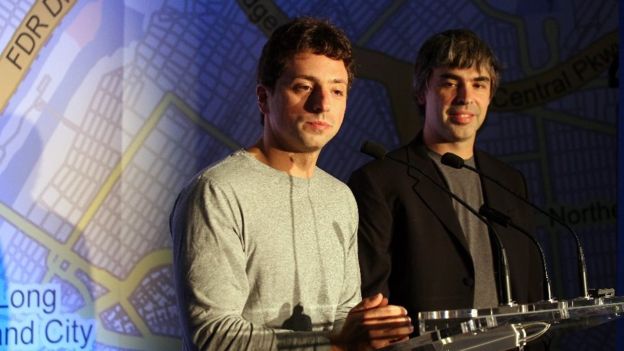
Google's co-founders are expected to be called to the stand
Less glamorous but perhaps more useful will be the numerous Uber engineers who will be rigorously questioned about how they were directed by Mr Levandowski, and whether those stolen documents and secrets ever surfaced in Uber's work.
Overseeing the proceedings is Judge Alsup, a favourite among journalists for his highly-quotable courtroom quips, but not a person either legal team will be looking forward to dealing with.
Judge Alsup is a force to be reckoned with: he famously learned some coding skills in order to have a better grasp on a different trial between Google and database specialist Oracle.
What are the strategies and risks?
Jury trials bring about a whole new psychology to how lawyers must approach a case. Attacks and rebuttals must be thorough but not overwhelming; simplified but not patronising.
Uber knows it could face a jury which, being from San Francisco, may already hold a negative view of the company.
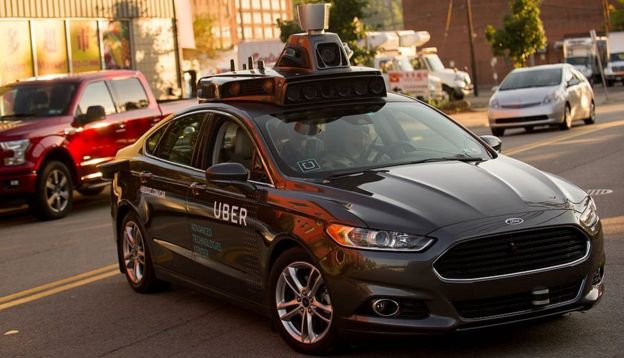
Uber denies making use of Waymo's technologies
During the selection process, Uber asked potential jurors if they were, had been, or just knew a taxi driver - such is the animosity over Uber's impact on traditional business. It also asked if anyone had deleted Uber's app in protest at various ethical decisions the company has made in recent times.
Uber's baggage in front of the five man, five woman jury can't be understated: Mr Kalanick has a reputation as a hard, cut-throat operator - and that's just to his friends.
Given a past of covering up a security breach, surveilling journalists, and using secret software to evade government officials, it will hardly be a huge leap for the jury to believe Mr Kalanick wasn't above tapping up a rival's star employee.
Privately, Uber accuses Waymo of wanting to dumb down the jury's technical expertise in the hope of getting jurors who know less about sophisticated technology. Waymo strongly denies this, and if it is to win it will need to do a lot more than paint Uber as some kind of tech bogeyman.
We can expect Judge Alsup to have little patience for anything that strays far from the intricate facts of the trade secrets in question.
Ultimately, it's up to Waymo to draw a clear line, from stolen documents, to Uber's self-driving work.
What are the potential outcomes?
Let's consider the jury decides that Uber stole and used all the trade secrets of which it's accused. That could mean it would have to pay more than $1bn in damages.
Calculating such an amount could be difficult, though. It's hard to measure the real cost to Waymo given the technology is yet to be commercialised, at least in the ways these companies envision.
More straightforward would be an injunction that would stop Uber's self-driving programme altogether.
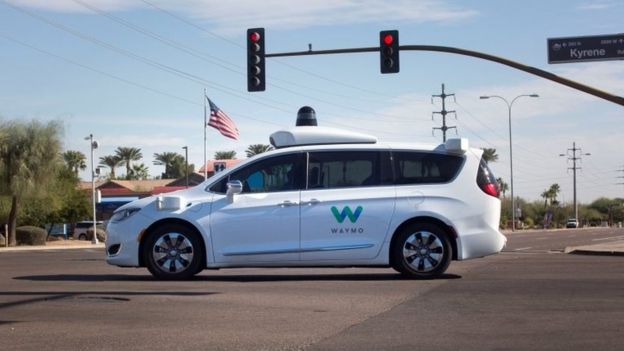
Waymo recently revealed that its cars self-drove more than two million miles (3.2 km) in 2017
That would be an extreme outcome - it's more likely that any injunction would just apply to whichever trade secrets the jury decides were infringed.
As I see it, there is a scenario would allow both companies to claim a moral victory, even if, technically, the decision goes Waymo's way.
If a jury decides Uber did steal and use trade secrets and an injunction is handed down, Uber will immediately brush it off by claiming it doesn't use the secrets anyway.
Indeed, the company has already outsourced its Lidar needs to San Jose-based Velodyne. At most, an injunction might impact Uber's plans to make the technology in-house.

Velodyne showed off its latest Lidar sensors at the CES tech expo in January
Another outcome, of course, is that Waymo fails to convince the jury that any trade secrets were stolen, and that's the end of that.
What is the bigger picture?
This case is being so keenly watched because it already represents an enormous argument in Silicon Valley, one about the cross-pollination of ideas and expertise.
When extraordinary brains do incredible work at powerful companies, what right do they have to take those ideas with them?
Uber unquestionably benefitted from Mr Levandowski's expertise. But is that because of trade secrets, or simply because of who he is?
The jury won't be asked that question, but the outcome of this case will be seen by many as providing an answer.
Latest Stories
-
Cucumbers – Making the most of them
1 hour -
Revenue growth to slowdown to GH¢209.3bn in 2025; T-bills will not be restructured – IC Research
2 hours -
Deloitte celebrates end-of-year Thanksgiving Service
3 hours -
Inflation to end 2025 between 10% and 12% – Databank Research
3 hours -
Government’s commitment to fiscal consolidation to remain strong in 2025
3 hours -
ImageBureau, April Communications take theatre to Nsawam Prisons
3 hours -
Bird flu kills 20 big cats at US animal sanctuary
4 hours -
Your peaceful conduct saved the country from tension – Clergymen commend Bawumia
4 hours -
A Nite of 1031 Laughs & Music to provide emergency insurance for patrons
4 hours -
Body found in wheel well of United plane after landing in Hawaii
4 hours -
Ghana Armed Forces dismisses viral audio alleging ammunition transfer
4 hours -
Former Hohoe MP Bernice Adiku Heloo passes on
6 hours -
CODEO calls for re-run of Ablekuma North, Dome Kwabenya parliamentary elections
6 hours -
4,155 cholera cases with 35 deaths recorded by December 23 – GHS
6 hours -
Mothers celebrate arrival of Christmas Day babies at Ridge Hospital
9 hours

